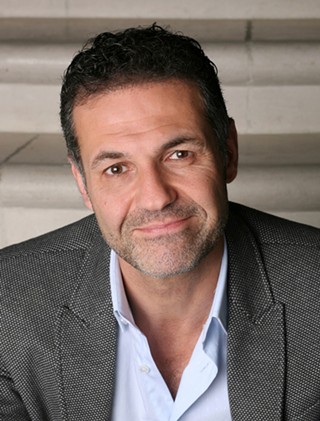
Khaled Hosseini (Provided)
“I get these letters from writers about how to become a successful writer and I just do not have a sexy answer for them,” he said. “Don’t write to get published, don’t write to get rich; write because you have something to say and unless you don’t write it down it’s going to drive you crazy.”
He would also never want you to get the impression that he sat down and wrote The Kite Runner, which has been translated into over 42 languages and published in 38 countries, in one go.“I don’t think that happens to anybody, somebody who comes out of left field who writes this big novel,” he said. “I don’t think anybody just wakes up and writes a book.”
The Kite Runner was the result of a lifelong passion for writing and a story that he felt needed to be told. It is a book that has, in his words, “humanized Afghanistan for western readers.” But that, again, would be a misrepresentation.
“I think that most people whose writing has strong sociopolitical leanings ultimately are driven by personal, intimate things,” he said.
Regardless of his intent, the book has, as a happy accident, helped readers understand the struggles of Afghanistan and its people through a narrative about a place that has seen strife for the past 40 years. Rather than paint the struggles of the Afghan people, especially those marginalized by war and occupation, in broad strokes, he chose to do a study of only one or two characters.
He doesn’t make grand statements about the politics and history of the region. Instead, Hosseini focuses on the microcosm of one family’s experiences, which play out against the backdrop of the country’s upheaval.
He hones the focus of his novels to a razor-sharp perception through which the reader gains insight into the commonalities of human life. This is what makes his novels so effective. He emphasizes that we are all more similar than our political leanings and the government of our homeland would have us believe.
“One of the byproducts of [my writing] is a window into Afghan life and sociocultural history, a bridge to many things Afghan,” he said.
It was a natural progression to want to help the country of his birth in some way, and his success has had more impact than he ever imagined.
“My situation as a writer presented me with an opportunity to play, albeit a small role … to help the people that populate my books,” he said.The Khaled Hosseini Foundation provides humanitarian assistance for the people of Afghanistan, especially refugees, and provides opportunities for healthcare and the education of Afghan women and girls. Hosseini is also a Goodwill Envoy to the United Nations Refugee Agency.
“I think to be Afghan and in my position and level of success and not take advantage of that would be grotesque,” he said.
The role of women in Afghan culture and its future is one of particular interest to Hosseini. His book A Thousand Splendid Suns tackles a large topic by focusing on the experiences of two Afghan women, whose lives are intertwined and changed by circumstances beyond their control.
Like The Kite Runner, the novel deals with the circumstances of Afghanistan’s history in terms of how it affects the two protagonists. With A Thousand Splendid Suns, Hosseini set out to create a story about a complex theme.“It [the novel] started with a big idea. Afghan women are absolutely crucial to the success of the country, and there are important lessons to be learned from the past, particularly after the Soviet withdrawal and the arrival of the Taliban,” he said.
Hosseini received critical acclaim for his portrait of the two women who tell the novel’s story. He was lauded for his ability to capture their voices authentically.
“The trick, if there is one, was to stop trying to experience the world from their perspective and let them come to me and reveal themselves,” he explained. “I think that was an important lesson … about all characters and one that has hopefully served me well.”
Hosseini is coming to Oklahoma City as the guest speaker at the Metropolitan Library Endowment Trust’s Literary Voices Event. The event is a fundraiser for the trust, which helps support the Metropolitan Library System with grants for various improvements systemwide.












